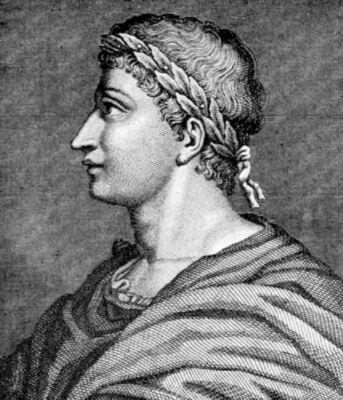Ovid was born on March 20, 43 BCE. in Sulmon (Abruzzo, Italy), under the name of Publius Ovidius Naso. He was one of the greatest Roman poets of the Augustan era. The son of a rich equine, a friend of Horace. He was associated with the poetic circle of Corvinus Messala.
He studied rhetoric, but then gave up his career as a clerk and devoted himself entirely to writing. As early as 16 BCE he was famous as the author of love poetry and the tragedy “Medea”, which, unfortunately, has not survived to our times. Soon after, he published “Heroids” (Heroides), a collection of fictional love letters from mythical heroines, and the poem “De medicamine faciei feminae”. At the same time, he started working on a collection of etiological elegies: “Calendar” (Fasti), an unfinished account of myths related to important dates in the Roman religious calendar, and “Metamorphoses” (Metamorphoses), Trojan, Greek and Italo-Roman myths collected in 15 books, dealing with the transformation of famous figures into animals, plants and celestial bodies. He wrote a beautiful poem about love, “Sztuka kochania” (Ars amatoria), contained in three books, “Miłostki” (Amores), “Lekeki na miłość” (Remedia amoris) and “About cosmetics” (Medicamina faciei feminae).
Work on the works was interrupted by the expulsion of the poet from Rome in 8 CE and moving to Tomis on the Black Sea. To this day, it is not certain what caused Ovid’s exile. There are various presumptions. It is believed that the reason could have been his frivolous work (“The Art of Loving”), the court scandal related to Augustus’ daughter – Julia the Elder, or accidental learning of the secrets of the imperial family, which forced Caesar to remove an inconvenient witness.
Ovid’s plea for recall from exile was never heard and the poet had to stay in Tomis for the rest of his life. The decision of Octavian Augustus was upheld by his successor, Tiberius. In the words of Ovid, “song and error” brought him doom. In exile, he wrote “Griefs” (Tristia) in 5 books, with a famous autobiography, and “Ibis”. In the “Letters of Pontus” (Epistulae ex Ponto) he complained about his fate, fearing that, being far from Rome, he would destroy his poetic talent.
His works were circulated in numerous copies around Rome. Octavian Augustus condemned Ovid’s work to oblivion (an order to remove works from Roman libraries), but it was preserved in copies and left a permanent mark in Roman literature.
He died in 17 CE, although some point to 18.
Creativity |
|


